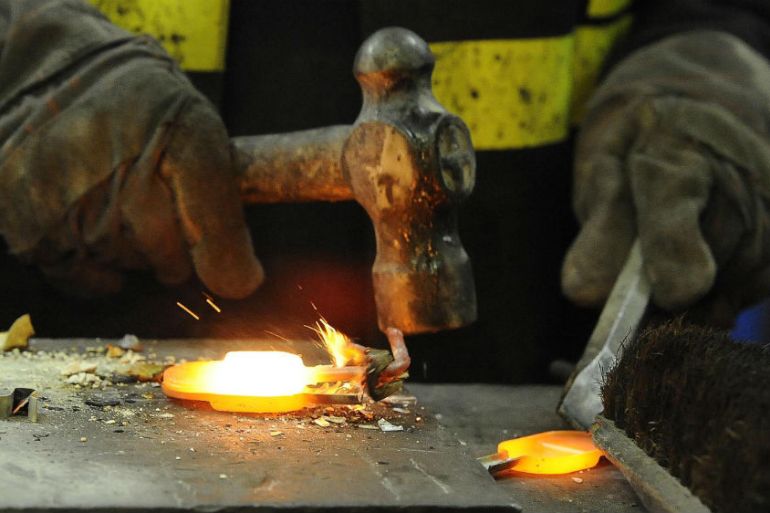British Steel ‘on the verge of collapse’, risking 25,000 jobs
Unions are urging government to intervene to save embattled steelworks.

British Steel, the beleaguered manufacturer which last week asked the United Kingdom government for a $95m bailout loan, is on the brink of collapse, a source told Reuters news agency.
The steelmaker’s owners, Greybull Capital, agreed to put up some of the money themselves, and the loan request was dropped to $38m.
Keep reading
list of 4 itemsRussia’s Putin eyes greater support from China for Ukraine war effort
India-Iran port deal: A gateway to Central Asia or a geostrategic headache?
India’s income inequality widens, should wealth be redistributed?
But if the crisis loan is not approved by Tuesday afternoon, administrators could be called in as early as Wednesday. The company employs 5,000 workers, mostly at a giant plant in the northern town of Scunthorpe, and a further 20,000 jobs are dependent upon its supply chain.
“Administration would be devastating for the thousands of workers and their families who rely on this key industry in a part of the country which has not had enough support and investment from government over decades,” said Gill Furness, Labour’s spokeswoman for steel.
“The UK steel industry is critical to our manufacturing base and is strategically important to UK industry.”
Unions have urged the government to approve the loan.
“Yesterday, the government, alongside trade unions and employers, signed a UK Steel Charter at Westminster,” GMB National Officer Ross Murdoch told Reuters.
“They must now put their money where their mouth is. GMB calls on the government and Greybull to redouble efforts to save this proud steelworks and the highly skilled jobs.”
Any financial support form the government to a steel company would have to be on a commercial basis, Whitehall’s Business Department noted in an email to Al Jazeera.
Business minister Andrew Stephenson said he met with representatives of TATA Steel on Monday.
“The government will leave no stone unturned in its bid to support the UK steel industry,” he told the House of Commons on Tuesday.
“Global economic considerations continue to be challenging for the industry,” he added.
“We will do whatever is in our power… to support all aspects of the UK steel sector.”
Nik Dakin, MP for Scunthorpe, was wearing a “Save Our Steel” badge in the House of Commons on Tuesday. “Does the minister agree the stakes are too high, for the government, for us, to fail?”
Stephenson replied: “When we are in a position to update the House we will do so… at this stage I cannot comment on specifics.”
Labour leader Jeremy Corbyn said the collapse of British Steel would be “devastating”.
“The government must act to secure the long-term future of the steelworks – protecting people’s livelihoods and the community,” he posted on Twitter.
History of the problem
British Steel has been in trouble for a while. Three weeks ago, the government agreed a $150m loan so that the company could make its payments to a European Union environmental scheme and avoid a $630m fine from European regulators.
Under the scheme, companies are awarded a certain number of “carbon credits” based on their target emissions outputs. If they perform well and emit less carbon, as British Steel did from 2013 to 2018, they can sell their remaining credits to those companies emitting more carbon into the atmosphere. British Steel sold off its remaining credits when Britain was expecting to leave the EU at the end of March.
Then Brexit was delayed by six months and the manufacturer faced a huge shortfall in its credits, facing a huge fine. On Tuesday, pro-Brexit politicians in the House of Commons urged their colleagues to pass Theresa May’s EU Withdrawal Agreement when it returns to parliament in order to give some certainty to businesses.
The steelmaker told The Guardian last week that its EU orders had dried up. In the event of a “no-deal” Brexit, WTO tariffs on steel would be 20 percent – a significant disincentive for European buyers.
About 70 percent of British Steel’s products are exported to either the EU or Turkey and North Africa, according to the Financial Times.
But British Steel’s problems go back further still. Formerly part of Tata Steel’s European operations, a deal to sell off the division fell apart in 2015, with would-be buyers citing China’s dumping of steel onto global markets causing unpredictable price fluctuations as a major reason for abandoning the purchase.
In 2016, Greybull Capital, a private investment firm, bought Tata’s steel division for a token amount of £1 ($1.27 at the current rate) – and renamed it British Steel, saving thousands of jobs.
Now, Greybull itself is facing additional scrutiny. In the two years following the acquisition, Greybull charged British Steel more than $20m a year in interest on loans it had itself provided, the Financial Times reported. The newly-owned British Steel also made a $50m investment in a French steelmaker.
Contacted by Al Jazeera, a spokesperson for the UK’s Department for Business, Energy and Industrial Strategy declined to comment directly on whether the loan was likely to be agreed, saying: “As the business department, we are in regular conversation with a wide range of companies.”